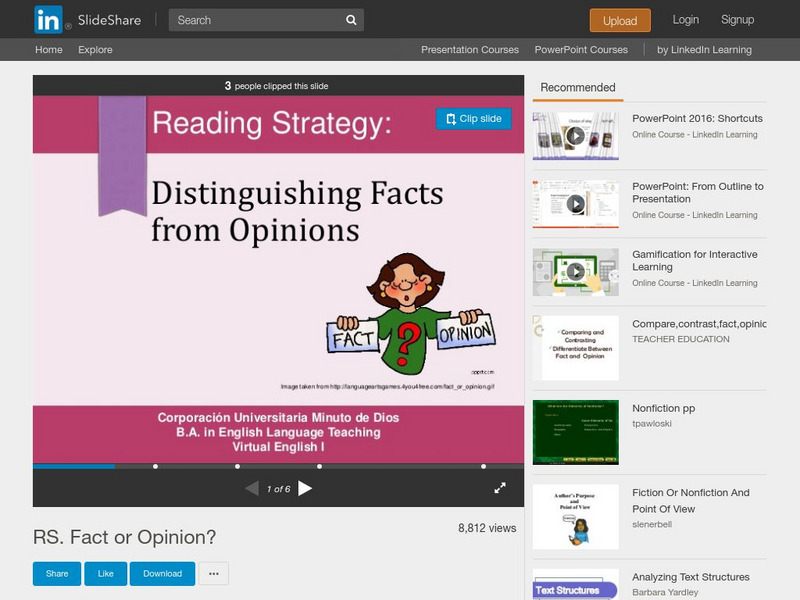Hi, what do you want to do?
Curated OER
What Did You Say?
Twelfth graders identify main ideas in reading selections. They read newspaper letters to the editor, identify the main ideas, list the supporting details, and present each side of the issue to the class.
Curated OER
Alaska's Cultures: Regions & Native Peoples of Alaska
Students read the essay "Did American Aborigines have Culture?". They discuss culture and what is meant by culture.
Curated OER
When You Put It All Together!
Students review information from variety of news sources found on the Internet, and compare and contrast the information.
Curated OER
Breaking News English: Russia Issues 5000-Rouble Note
In this English worksheet, students read "Russia Issues 5000-Rouble Note," and then respond to 47 fill in the blank, 7 short answer, 20 matching, and 8 true or false questions about the selection.
Curated OER
Breaking News English: Podcast is 2005 Word of the Year
In this English worksheet, students read "Podcast is 2005 Word of the Year," and then respond to 47 fill in the blank, 7 short answer, 20 matching, and 8 true or false questions about the selection.
Curated OER
Couch Potato or Inertia Victim?
Sixth graders how primary research is carried out. They design a simple survey questionnaire to interview people about their week average television watching time. They analyze the results and write a report based on the information.
Curated OER
Chinese, Japanese, & Korean Immigration to the U. S.
Young scholars study immigration of people from Southeast Asian countries to the United States. Pupils create maps and geographically illustrate the immigration. Using the internet, students research an assigned topic. They write an...
Curated OER
Fluoride in Durango's Water-Helpful or Harmful?
Third graders complete several activities in their quest to find out about the addition of fluoride to city water. First, they create a guide sheet to help organize notes. The next two steps involve taking notes through guided practice....
Curated OER
Right of Privacy: 4th Amendment
Students are introduced to the 4th Amendment of the Washington state Constitution. In groups, they examine the Constitution of the state of Washington and compare it to the United States Constitution. They role play the role Supreme...
Curated OER
Decision Making Lesson Plans
Critical thinking skills, such as decision making, can make students look at the information they receive in a new light.
Curated OER
Michael Jackson Lessons: A Cross-Curricular Experience
By learning about Michael Jackson through these lesson plans, students can explore history, science, math, etc . . .
Curated OER
The Furry News: How to Make a Newspaper
Students investigate the process of making a newspaper using children's literature to create context for the instructional activity. The readers are asked to predict the events of the story as it is read to them. Then the teacher uses...
Curated OER
Classroom Seating: Which Arrangement is Best?
The way you arrange your students' desks is an important choice that will impact your classroom environment.
Curated OER
How Do Values Shape Conflicts?
Students work through conflict. In this conflict resolution lesson plan, students participate in a simulation that requires them to consider both sides of the whaling issue.
Scholastic
Straight Talk on Prescription Drugs
Young scholars discover how doctors custom fit prescription drugs to patients. For this health science instructional activity, students explain the risks associated with drug abuse. They discuss common myths about prescription drugs.
Curated OER
Creative Writing
Eleventh graders write a persuasive letter to the editor using the writing process.
Read Works
Read Works: Fourth Grade: Two Lesson Unit: Fact and Opinion
[Free Registration/Login Required] A two-lesson unit on fact and opinion through which students identify facts and opinions in a newspaper article and understand how facts support opinions in an editorial. With free login, users have...
Alabama Learning Exchange
Alex: Newspapers: Facts and Opinions
In order to sharpen a student's understanding of the differences between facts and opinions, this lesson incorporates both the close reading of a newspaper and the writing of a factual article and a letter to the editor.
Tom Richey
Slide Share: Facts and Opinions
This slideshow focuses on facts and opinions; it provides definitions, examples, and articles for practice.
Read Works
Read Works: Washington Rides Again
[Free Registration/Login Required] An informational text about wax statues of George Washington at Mount Vernon in Virginia. A question sheet is available to help students build skills in identifying fact and opinion.
Read Works
Read Works: Seven Billion and Counting
[Free Registration/Login Required] An informational text about the increasing world population. A question sheet is available to help students build skills in reading comprehension.
Read Works
Read Works: Should You Be Afraid of Sharks?
[Free Registration/Login Required] An informational text about sharks and why they should not be feared. A question sheet is available to help students build skills in reading comprehension.
Read Works
Read Works: From Pet to Threat
[Free Registration/Login Required] An informational text about problems caused by exotic pets like pythons and tigers. A question sheet is available to help students build skills in reading comprehension.




























